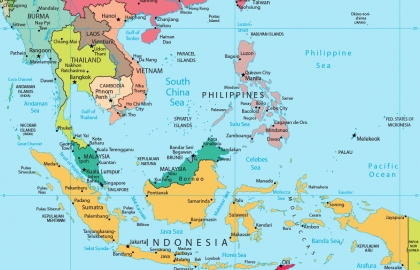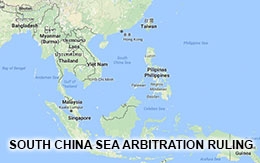Law Of The Sea And Ocean Governance In Southeast Asia: Comparative Lessons From Europe On Pragmatism And Principle
One of the most pressing challenges in contemporary law of the sea relates to how best to reconcile the increased assertion by States of territorial sovereignty over offshore geographical features with the corresponding curtailment of navigation freedoms.

One of the most pressing challenges in contemporary law of the sea relates to how best to reconcile the increased assertion by States of territorial sovereignty over offshore geographical features, such as islands, rocks and low-tide elevations, with the corresponding curtailment of navigation freedoms, which are so crucial for the effective functioning of the world’s ocean trading routes. Nowhere are the on-going processes of the “territorialization” of maritime space, creeping jurisdiction and the militarization of disputes, more evident than in the South China and East China Seas, two regional seas through which high volume ship-borne trade passes daily.
When considering the destabilizing effects of the crises in the South China Sea (SCS) and the risks that it poses to the orderly functioning and stability of international trade, it is pertinent to recall that the great French political theorist and jurisprudential scholar, Montesquieu, observed presciently in his celebrated work, De L’Esprit Des Lois (The Spirit of the Laws, 1758) that:
“…the natural effect of commerce is to lead to peace. Two nations that trade together become mutually dependent: if one has an interest in buying, the other has one in selling; and all unions are based on mutual needs”.
Almost two hundred years later, the writings and political creed of Montesquieu, the progenitor of the principle of interdependence, profoundly influenced the political philosophy of Jean Monnet and Robert Schuman, who subsequently became the forefathers of European integration. Common rules on trade and the harmonization of over three-dozen other policy areas have since contributed to stability in Europe and have engendered regional support for the maintenance of a peaceful economic and political union, that is founded on the rule of law and a free trade system. Undoubtedly, they are the sina qua non of European Union (EU) integration.
Similarly, the 1982 United Nations Convention on the Law of the Sea (the Convention) and its associated agreements contribute enormously to clarity and certainty in the rule of law as it applies to the ocean and related matters. By doing so, this sophisticated web of international and regional treaties fosters the healthy development of the global economy and growth of international trade and commerce. Nonetheless, a striking feature of the implementation of the law of the sea by coastal States worldwide is their continued obsession with advancing territorial claims and the projection of maritime zones from a broad swathe of coastal and oceanographic features. In many instances, as is evident from the specialist literature, their practice in this regard does not always conform to the letter or indeed to the spirit of the prescriptive norms set down by the Convention. This appears to be particularly the case in the South and East China Seas regions.
In marked contrast and somewhat ironically in view of the turbulent and territorial nature of European history, the precise legal status of offshore features has not contributed to the same degree of political tension or acrimonious dispute between the 23 coastal Member States that make-up the EU. Indeed, it appears that apart from the intractable issues associated with irregular migration across the Mediterranean Sea, the relative stability of ocean law related matters in Europe can be partly attributed to the progressive role of EU law in establishing a common framework for regional trade, the management of offshore activities, including most notably, fisheries, as well as the adoption of a unified trans-national approach to the protection and preservation of the marine environment.
Allied to this and independently of the EU, several European Member States and neighboring coastal States have taken a pragmatic role to the management of transboundary hydrocarbon resources, as well as to the delineation and delimitation of maritime boundaries. Indeed, in some notable instances, they have rolled-back excessive maritime claims in the North Sea and the North Atlantic and demonstrated considerable constraint in establishing exclusive economic zones in the Mediterranean Sea, with a view to averting tension with neighboring States within the region.
With a view to sharing knowledge on European regional practice, the discussion in this paper highlights contemporary trends in the EU’s approach to fisheries management, marine environmental protection, maritime spatial planning, ocean governance, as well as the cooperative practice of the Member States in submitting joint-submissions to the Commission on the Limits of the Continental Shelf under Article 76 of the Convention. On all of these matters, it is increasingly evident that the EU and its constituent Member States are pursuing a functional approach to the implementation of the Convention, with pragmatism trumping principle in many instances.
This in turn has helped deflate tensions regarding long-standing maritime boundary and resource related issues. Ultimately, it is not beyond the bounds of possibility that such an approach could be germane to the resolution of maritime disputes elsewhere in the world including those that have become part and parcel of regional affairs in Southeast Asia. Indeed, in the period after the Annex VII Arbitration Tribunal renders its judgment on the merits phase of the arbitration between the Philippines and China, expected in June 2016, there may well be a need for all concerned parties to search for innovative solutions to the longstanding disputes that have characterized bilateral and regional relations in the SCS most notably.
...
Dr. Ronan Long is Research Director at the Marine Law and Ocean Policy Centre, which is a cross-faculty initiative between participants from the Department of Earth and Ocean Sciences, the Law School and Trinity College Dublin.
The paper was presented at the High-level Workshop: "Maritime Issues and United Nations Convention on the Laws of the Sea: Sharing European and Asia Approaches to Territorial Disputes", 4-5 June 2015, Halong Bay, Vietnam. This workshop is co-organized by Diplomatic Academy of Vietnam (DAV) and EU Delegation in Hanoi through EU-Vietnam Strategic Dialogue Facility.
Click here for full text.










